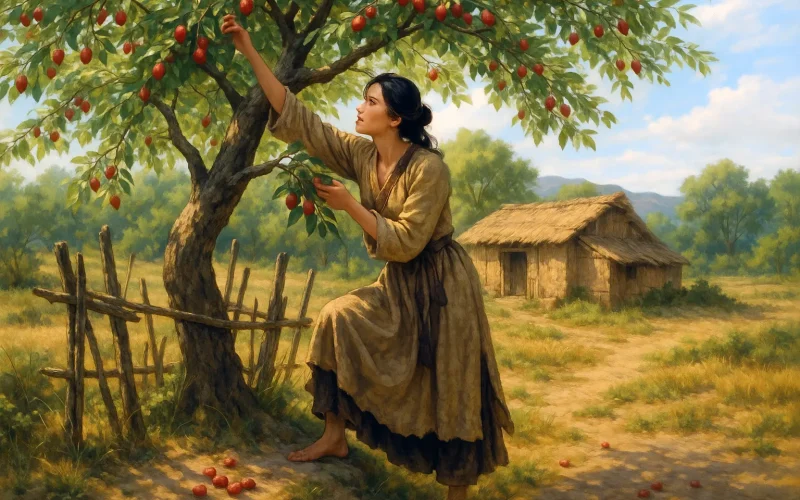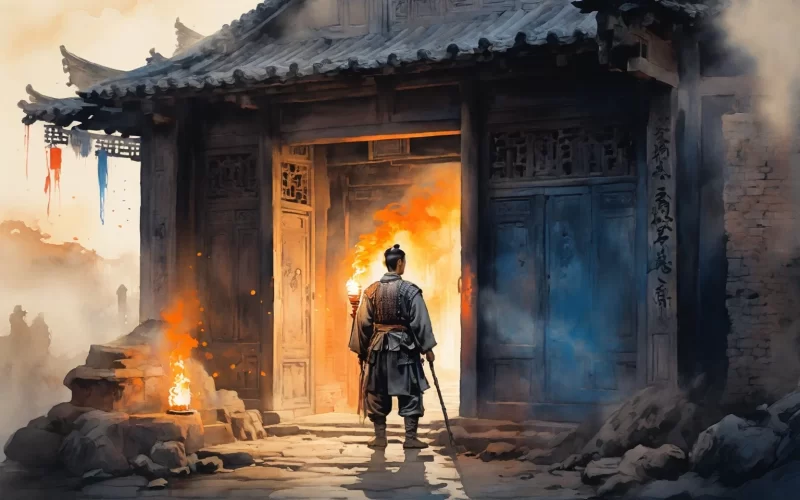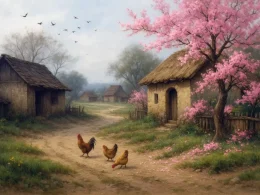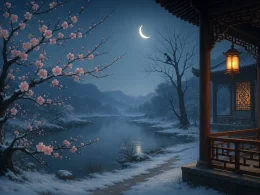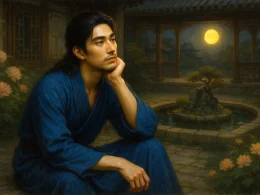Deja, por favor, a vuestra vecina
recoger los dátiles del patio
Es una pobre viuda, sin hijos,
sin recursos, sin amparo.
Es la miseria 10 que la obliga.
Sé bondadoso y afectuoso con ella.
Tiene miedo y está avergonzada.
EI seto le ha despertado recelos,
mas no deberá desconfiar del vecino.
Me han dicho que con tantos,
tantísimos tributos,
la gente está tan estrujada
como limón sin jugo.
Pensando en las catástrofes de la guerra,
tengo los ojos anegados en lágrimas.
Texto original
「又呈吴郎」
杜甫
堂前扑枣任西邻,无食无儿一妇人。
不为困穷宁有此?只缘恐惧转须亲。
即防远客虽多事,便插疏篱却甚真。
已诉征求贫到骨,正思戎马泪盈巾。
Antigua práctica
Este poema fue escrito en el año 767 d.C., durante la estancia de Du Fu en Fengjie, Chongqing. En ese momento, vivía en una cabaña al oeste de Rangxi, donde había varios árboles de dátiles frente a su casa. Una viuda pobre que vivía al oeste solía venir a recoger dátiles, y Du Fu, siendo una persona generosa, nunca la molestaba. Más tarde, Du Fu cedió la cabaña a un pariente llamado Wu Lang y se mudó a Dongtun. Sin embargo, Wu Lang puso una cerca alrededor de la cabaña para evitar que la viuda siguiera recogiendo dátiles. La viuda se quejó con Du Fu, quien luego escribió este poema para aconsejar a Wu Lang.
Primera estrofa: “堂前扑枣任西邻,无食无儿一妇人。”
Táng qián pū zǎo rèn xī lín, wú shí wú ér yī fù rén.
"Dejo que la vecina del oeste recoja dátiles frente a mi casa; es una mujer sin comida ni hijos."
El poema comienza directamente con el tema, mostrando la tolerancia y comprensión de Du Fu hacia la viuda. El poeta no impide que la viuda recoja dátiles porque conoce su difícil situación y su pobreza. La sinceridad de estos versos prepara el terreno para el consejo que sigue.
Segunda estrofa: “不为困穷宁有此?只缘恐惧转须亲。”
Bù wéi kùn qióng níng yǒu cǐ? Zhī yuán kǒng jù zhuǎn xū qīn.
"Si no fuera por su pobreza, ¿haría esto? Precisamente porque tiene miedo, deberíamos ser más amables con ella."
Estos versos profundizan en la desesperación de la viuda. Ella recoge dátiles por necesidad, y su miedo refleja la falta de seguridad en un entorno social inestable. El poeta insta a Wu Lang a tratar a la viuda con compasión, mostrando la empatía de Du Fu hacia los menos afortunados.
Tercera estrofa: “即防远客虽多事,便插疏篱却甚真。”
Jí fáng yuǎn kè suī duō shì, biàn chā shū lí què shèn zhēn.
"Ella se precave de ti, un recién llegado, aunque sea innecesario; pero al poner la cerca, confirmas sus sospechas."
Estos versos, aunque aparentemente suaves, critican a Wu Lang. Du Fu entiende la precaución de la viuda, pero enfatiza que la acción de Wu Lang es desalentadora. Wu Lang, siendo un invitado en la cabaña, pone una cerca que excluye a otros, mostrando falta de empatía. El poeta usa esto para aconsejar a Wu Lang sobre la importancia de la compasión.
Cuarta estrofa: “已诉征求贫到骨,正思戎马泪盈巾。”
Yǐ sù zhēng qiú pín dào gǔ, zhèng sī róng mǎ lèi yíng jīn.
"Ella se queja de que los impuestos la han dejado en la pobreza extrema; al pensar en la guerra, sus lágrimas empapan su pañuelo."
Esta estrofa amplía la perspectiva, revelando las raíces sociales de la pobreza de la viuda: los impuestos opresivos y la guerra continua. Du Fu no solo simpatiza con la viuda, sino que también se preocupa por la inestabilidad social y el sufrimiento del pueblo. El poema termina con una reflexión sobre el sufrimiento de la viuda, profundizando el tono emocional y provocando empatía y reflexión.
Análisis integral
Este poema comienza con un pequeño incidente cotidiano y, a través del consejo a Wu Lang, expresa una profunda simpatía por los pobres en tiempos de guerra. Du Fu integra sus emociones en la triste historia de la viuda, reflejando las dificultades de las personas comunes en una era turbulenta. No solo expone el dolor causado por los impuestos opresivos y la guerra, sino que también llama a la responsabilidad social de ayudarse mutuamente. A través de una narrativa sincera y un consejo persuasivo, el poeta muestra un profundo espíritu humanitario.
Características literarias
- Lo pequeño refleja lo grande, progresión gradual: El poema comienza con el pequeño incidente de la viuda recogiendo dátiles y avanza hacia los problemas sociales más amplios de impuestos opresivos y guerra, mostrando profundidad y amplitud.
- Lenguaje suave, emociones sinceras: Al aconsejar a Wu Lang, Du Fu usa un tono amable y moderado, evitando críticas directas pero transmitiendo hábilmente su mensaje.
- Detalles vívidos, descripción precisa: Detalles como "recoger dátiles", "sin comida ni hijos" y "poner una cerca" pintan vívidamente la difícil situación de la viuda y la indiferencia de Wu Lang, aumentando el impacto emocional del poema.
- Preocupación social, emociones profundas: El poema no solo se enfoca en el sufrimiento individual, sino que también revela la crisis social causada por la guerra y los impuestos opresivos, mostrando la profunda compasión del poeta por el pueblo.
Reflexión contemporánea
Este poema muestra la profunda preocupación de Du Fu por los menos afortunados y expone el sufrimiento de las personas comunes en tiempos turbulentos. El poeta aconseja a Wu Lang con empatía, mostrando un espíritu de generosidad y comprensión. Nos recuerda que, en un entorno social caótico, debemos tratar a los más vulnerables con bondad, entender sus dificultades y hacer lo posible para ayudarlos.
Traductor
Chen Guo-jian(陈国坚)
Sobre el poeta

Du Fu(杜甫), 712-770 d.C., era natural de Xiangfan, provincia de Hubei, y nació en Gongyi, provincia de Henan. Du Fu tuvo una vida dura, y su vida de agitación y desplazamiento le hizo sentir las penurias de las masas, por lo que sus poemas siempre estuvieron estrechamente relacionados con la actualidad, reflejando la vida social de aquella época de una forma más completa, con pensamientos profundos y un amplio ámbito.






